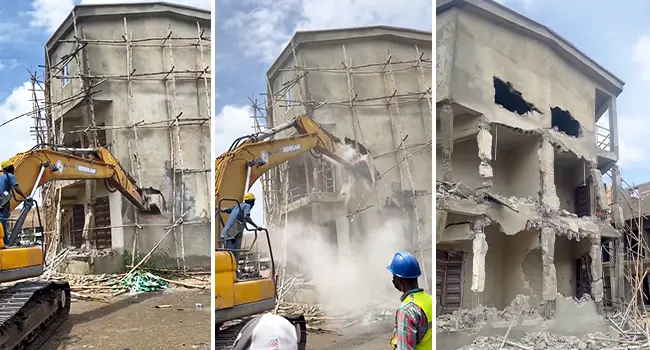The Lagos State Government has defended the recent demolition of structures at the Trade Fair Complex in Ojo, insisting the exercise was based on technical violations, not ethnicity.
Speaking Thursday on Channels Television’s The Morning Brief, Commissioner for Physical Planning and Urban Development, Olumide Oluyinka, dismissed allegations of ethnic targeting.
“That is not true,” Oluyinka said. “We’ve carried out enforcement in Owode Onirin, Idumota, and Ikeja. This is not ethnic, it’s technical. We’re simply doing our job.”
He added that similar actions had been taken across Lagos, including on Lagos Island, where he personally led a team that affected even the palace of a white cap chief.
“This is Nigeria for all of us. The law applies to everyone,” he said.
‘Illegal leasing, unsafe structures’
Oluyinka accused the Trade Fair Complex management of illegally leasing plots to private developers who bypassed regulatory processes.
“They leased land to third parties who brought in their own consultants and contractors, without recourse to the law,” he said. “There was no proper layout. One three-storey building was just two feet from the road. Shop doors opened onto the street. That’s not architecture — that’s chaos.”
‘Ample notice given’
The commissioner said defaulters had over a year to regularise their buildings.
“I led a team there in March 2024, that’s over 18 months ago. We engaged with management and even faced hostility,” he said. “Our officers were locked up for hours while trying to serve notices. Police had to intervene. So no one can claim they were unaware.”
State of the complex ‘deplorable’
Oluyinka lamented the condition of the Trade Fair Complex, citing blocked drainages, refuse buildup, and broken infrastructure.
“It’s a shame we allowed it to deteriorate this badly. But it’s our responsibility to sanitise the area. We can’t let it continue.”
Demolition details
The demolition began on September 25, targeting illegal, defective, and unapproved buildings, as well as structures erected on road setbacks and drainage channels.
The operation was led by the Ministry of Physical Planning, with support from the Lagos State Building Control Agency (LASBCA), the Urban Renewal Agency, and the Physical Planning Permit Authority.
It was also backed by the Lagos State House of Assembly, Office of Infrastructure, and security agencies.
Jubril Gawat, Governor Sanwo-Olu’s Senior Special Assistant on New Media, confirmed the operation on X, saying it was focused on restoring order to the area.
Two weeks earlier, the state government suspended all land reclamation activities across Lagos due to mounting environmental risks.
Commissioner for Environment and Water Resources, Tokunbo Wahab, said unregulated reclamation was affecting wetlands, floodplains, and lagoons.
He listed affected areas as Parkview, Banana Island, Osborne, Ikoyi, Victoria Island Extension, Lekki, Ajah, Oworonshoki, and parts of Ikorodu.
“Lagos’s low-lying topography and fragile ecosystem cannot withstand indiscriminate reclamation without grave consequences,” Wahab warned.


